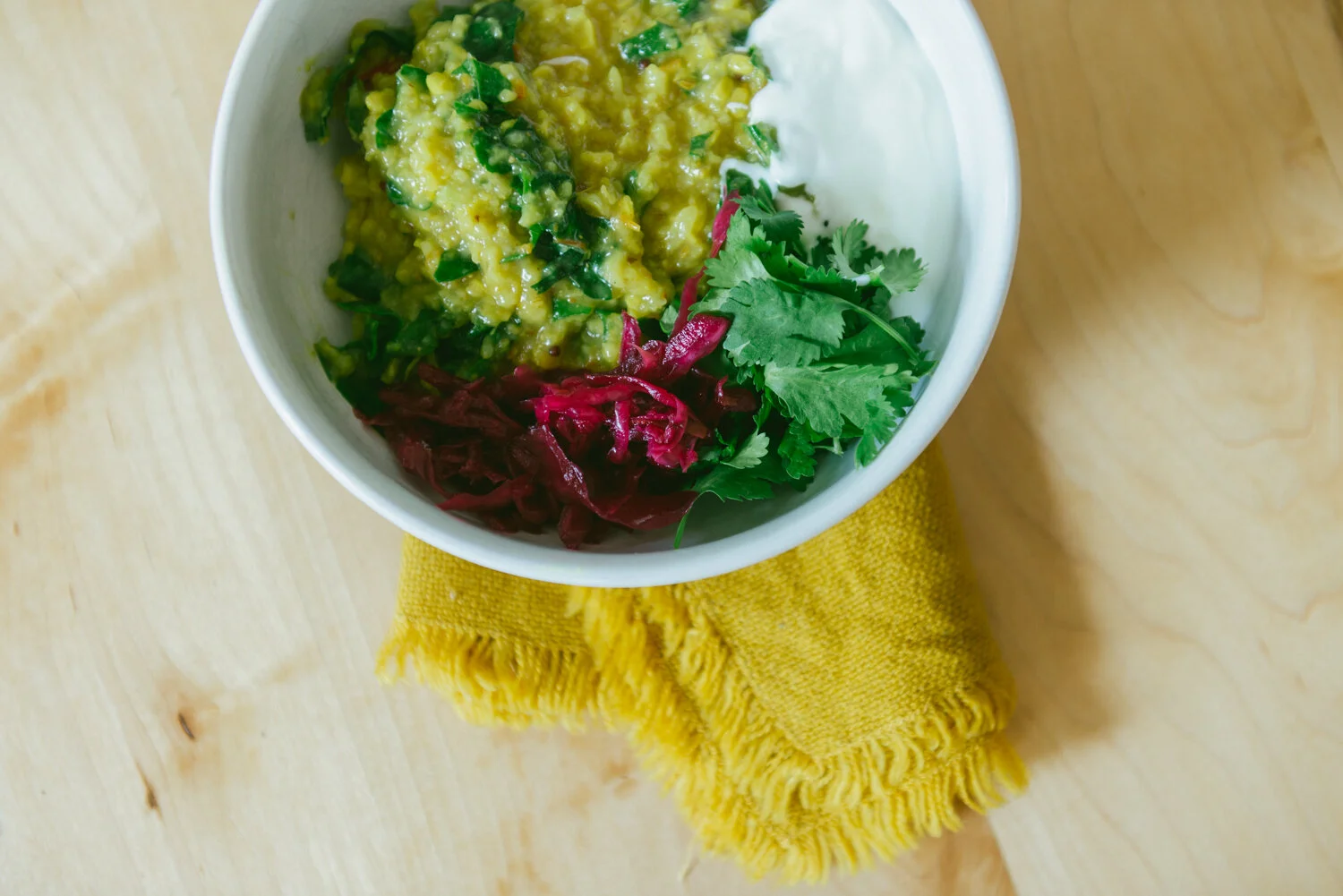Kitchari is one of our absolute favorite go-to self care recipes.
Central to the Ayurvedic way of life, kitchari is akin to porridge made from basmati rice, mung dal, spices and ghee. It is the ultimate nourishing, healing dish that is excellent for supporting the body’s natural detoxification process and encouraging rejuvenation of the cells.
Simple and grounding, kitchari is perfect to have not only during a cleanse, but during times of transition, weak immunity, personal exhaustion and sickness as well. It is warm and comforting, easy for the body to digest, and supports all of the tissues. Together, the mung and rice make a complete protein. The recipe calls for simple whole ingredients that are easy for the body to digest. Don’t miss the dosha variations at the bottom of the page!
If you’re not sure where to source ingredients like yellow split mung, cultured ghee, or mineral rock salt, we recommend ordering through Banyan Botanicals or Divya’s Kitchen because we trust them to produce the highest quality Ayurvedic products in ways that align with our values. Pure Indian Foods makes the Best Hing Ever (literally, that’s what it’s called). Other brands of hing often have gluten in them as a filler, this one does not.
Kitchari is a grounding and nourishing meal that is traditional in Ayurveda, and is designed to bring ease the digestive system. It should taste GOOD — if it doesn't, add more salt and ghee. Kitchari also should be soupy — so if it's too thick (like the texture of oatmeal), add more water during or after the cooking process. Especially in the case that digestion has been slow or heavy, the kitchari should be made extra soupy. You can enjoy your kitchari with greens mixed in (kale, chard or spinach) at the end or a side of cooked vegetables.
INGREDIENTS
¼ cup yellow mung dahl (split and hulled mung bean)
½ cup basmati rice (wash thoroughly) or quinoa
1 bay leaf
1 whole cardamom pod
2-inch piece fresh ginger (grated or sliced into matchsticks)
1teaspoon turmeric powder (or ½-inch piece fresh turmeric, grated)
1 teaspoon each ground cumin, coriander and fennel
a pinch of hing (optional)
¼ teaspoon brown mustard seeds (optional)
5-6 cups of pure water (or broth)
Mineral rock salt (to taste)
1-2 Tablespoon ghee or coconut oil
Cilantro and lime/lemon wedge to garnish
NOTE: If you’d rather not source all of these spices, replace them with 1 Tbsp Kitchari Spice Mix.
*Advanced Preparation*
Soak mung overnight, or for at least 4 hours.
3 METHODs to choose from:
Instant Pot (our preferred way)
Rinse the mung dal and rice (separately) until the water runs clear.
Turn Instant Pot to saute mode and melt ghee or coconut oil. When the oil is hot, add mustard seeds and stir periodically until they start to pop. 1-2 minutes.
Turn off saute mode to prevent burning. (It will still be hot enough to toast your other spices.)
Add bay leaf, cardamom pod, fresh turmeric and ginger. Lightly sauté for 1-2 minutes.
Add remaining powdered spices and sauté for another 15-30 seconds.
Stir in mung dal and rice until coated. Add the water.
Secure the lid on your Instant Pot and set to pressure cook on high for 30 minutes. Make sure the steam valve is closed).
When the Instant Pot indicates it’s finished, turn the pressure valve to release the steam. Remove the lid and stir in your choice of greens.
Add mineral salt and ghee to taste.
Sauté other vegetables in ghee, salt and spices as an additional topping.
Garnish with cilantro and lime/lemon juice (optional).
Stovetop
Rinse the mung dal and rice (separately) until the water runs clear.
Melt ghee or coconut oil, add all spices and lightly sauté.
Add mung dal and water. Bring to a boil.
Cover, reduce heat to a simmer and cook the dal for 45-60 minutes.
After 45-60 minutes, add rice, and simmer with the lid on for another 30+ minutes until all contents are well-cooked.
If kitchari is not soft and soupy, add more water and continue cooking with the lid on.
Once nearly done, stir in your choice of greens.
Add mineral salt and ghee to taste.
Sauté other vegetables in ghee, salt and spices to use as a topping.
Garnish with cilantro and fresh lime/lemon juice (optional).
Slow Cooker or Crockpot
Rinse the mung dal and rice until the water runs clear.
Melt ghee or coconut oil, add all spices and lightly sauté.
Add mung dal and water. Turn crockpot to high setting. Cook the dal for 45 minutes.
After 45 minutes, add rice and optional veggies, turn to low and cook overnight.
Add mineral salt and ghee to taste.
Garnish with cilantro and lemon/lime (optional).
Variations for vata, pitta and kapha
Adapt your Kitchari to soothe your doshas
Soothe Vata
Use twice the amount of ghee or oil.
Increase the amount of fresh ginger.
Add a whole cinnamon stick when sauteing the ginger.
Add a handful of fresh curry leaves when sauteing the ginger.
Use double the amount of rice.
Best veggies for a vata variation are carrots, beets, zucchini, peas, sweet potatoes, spinach and asparagus.
Soothe Pitta
Use half the amount of mustard seeds and black pepper, or omit mustard seeds altogether.
Increase the fennel or and coriander.
Add a couple whole cloves when sauteing the ginger.
Double the cardamom pods.
Replace ghee with coconut oil.
Use quinoa instead of rice to increase the protein content.
Best veggies for a pitta variation are leafy greens, fennel bulb, broccoli, green beans, cauliflower, asparagus, zucchini and bokchoy.
Garnish with lime, rather than lemon.
Soothe Kapha
Use half the amount of ghee or oil.
Add a handful of fresh curry leaves when sauteing the ginger.
Use quinoa, millet, or amaranth instead of rice.
Add powdered ginger and/or fenugreek to the oil when cooking the spices.
Add a pinch of cayenne pepper while cooking, or a couple Thai chilies.
Best veggies for a kapha variation are leafy greens, Brussels sprouts, cauliflower, beets, radishes and celery.
Garnish with fresh parsley or sauerkraut.
(Dosha specific variations inspired by Kripalu)
Love kitchari? Try our Reset for Resilience, a 28-day program with 5 days of active cleansing. Support optimal metabolism and gently detoxify with a cleanse that will leave you feeling nourished and energized rather than fatigued and depleted. This is a simple and enjoyable step toward lasting wellness that invites you to truly thrive. LEARN MORE.
highly recommend THE RESET!
““This is a gentle approach to a cleanse, making it manageable and something that I feel I can continue afterwards! Other cleanses have been so “all or nothing” and I often would plunge back into old habits immediately after. With this one, I am easily eating healthier by choice. I am resting and listening to my body. I couldn’t do the cleanse exactly like it is designed because I had work and family commitments but the design of it makes me still feel successful. The focus is on the journey!””
I can’t even believe how good I’m feeling
““I almost can’t even believe how good I have been feeling. In the past when I’ve done a whole30, which is a month long process, I feel good, but not in FIVE days of cleansing!
I am feeling so much more joy and ease, and the capacity to meet life as it comes. I’m realizing how close to burnout I was without even realizing it.”








